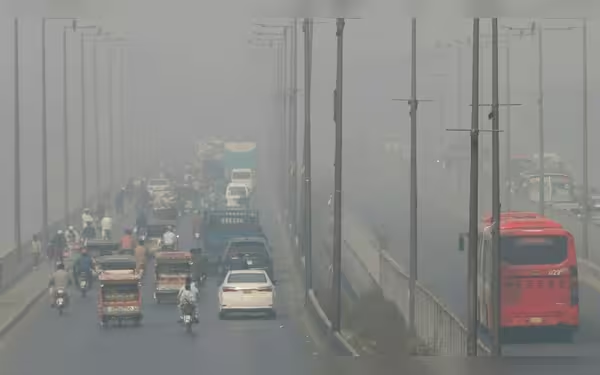Thursday, November 7, 2024 08:37 AM
India Imposes Fines on Polluting Vehicles and Construction Sites
- 60,000 vehicles fined for pollution violations
- New Delhi's air quality rated 'very poor'
- Lahore also faces severe pollution challenges
 Image Credits: brecorder
Image Credits: brecorderIndia fines thousands of vehicles and construction sites as New Delhi's air quality reaches alarming levels, prompting urgent action against pollution.
In recent weeks, the air quality in New Delhi, India, has reached alarming levels, prompting authorities to take decisive action against pollution. The city, which has been labeled the "world’s most polluted major city" by the Swiss group IQAir, has seen a significant increase in pollution due to various factors, including vehicle emissions and construction activities. To combat this pressing issue, officials have imposed fines on thousands of vehicles and construction sites that have violated pollution regulations.
According to reports, nearly 60,000 vehicles and over 7,500 construction sites have been penalized for failing to adhere to pollution control measures. The Central Pollution Control Board (CPCB) has classified the air quality conditions as "very poor," with a concerning score of 373 on its pollution index. This index rates air quality from zero to 50 as "good," highlighting the severity of the situation.
Among the vehicles fined, approximately 54,000 were found to lack a "pollution under control" (PUC) certificate, which is essential for demonstrating that emissions are within permissible limits. Additionally, around 3,900 vehicles were impounded for being "overaged," indicating that they were too old to meet current emission standards. In a further crackdown, environmental compensation payments have been mandated for 597 construction sites, while 56 sites have been ordered to cease operations.
New Delhi faces a recurring battle with pollution every winter, as cold air traps emissions, dust, and smoke from agricultural fires in neighboring states like Punjab and Haryana. This seasonal phenomenon often leads to school closures and restrictions on construction activities to protect public health. The earth sciences ministry has warned that air quality in the region is expected to remain "very poor" until at least Wednesday, with predictions of conditions ranging from "very poor" to "severe" for the following six days.
The CPCB has indicated that a "severe" rating, which falls between 401 and 500 on its index, poses serious health risks, particularly for individuals with pre-existing health conditions. The implications of rising pollution levels are dire; research from the University of Chicago’s Energy Policy Institute (EPIC) suggests that pollution can reduce life expectancy in South Asia by more than five years.
In a related development, Lahore, Pakistan’s second-largest city, has also been grappling with severe pollution, recently ranked as the "world’s second most polluted city" by IQAir. In response to the hazardous air quality, Lahore has temporarily closed primary schools and advised residents to remain indoors. The provincial government has expressed intentions to engage in discussions with India to address the cross-border pollution issues, attributing some of the deteriorating air quality to pollution drifting in from India.
As the situation unfolds, it is clear that air pollution is not just a local issue but a regional crisis that requires collaborative efforts from neighboring countries. The health and well-being of millions depend on effective measures to combat pollution. It is imperative for governments, industries, and citizens alike to work together to create a cleaner, healthier environment for future generations.













